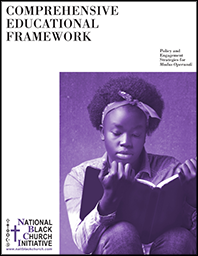Education Initiative Home
National Black Church Initiative Comprehensive Educational Framework
Through the National Black Church Initiative's Comprehensive Educational Framework, the black
church acknowledges with the changing environment in methodological approaches, resources, and technology come
the need to embrace innovative and culturally-relevant education and research-focused models. Particularly, for the next 50 years, such demands require an inclusive approach to ensure the African American community implements a plan to surpass performance expectations.
The plan will offer standards for public and higher education purported by the church to ensure school age children and aspiring young adults have access to the quality education and opportunities. The National Black Church Initiative's Comprehensive Educational Framework is an expansion of the documented work already began through this initiative.
Thus, using policy and engagement-centered measures as informed by the included documented work, the National Black Church Initiative strategically will implement diverse efforts in the National Black Church Initiative's Comprehensive Education Framework to address and (re)dress issues affecting African American with regards to education at primary, secondary, and higher education levels.
Comprehensive Educational Framework - Policy and Engagement Strategies for Modus Operandi
 The National Black Church Initiative has engaged in various programmatic activities prioritizing the importance of primary education for preparing children appropriately to be competitive in schools.
The National Black Church Initiative has engaged in various programmatic activities prioritizing the importance of primary education for preparing children appropriately to be competitive in schools. Some of those activities include collaborative efforts with Florida State University and the establishment of the Childhood Advocacy and Development Institute. Through these activities, the National Black Church Initiative is identifying best practices for establishing the foundational standards of the children and families in the congregations served.
- General Overview of Primary Education: The Foundational Standard for Educational Excellence
- General Overview of Secondary Education: The Connecting Link for Educational Excellence
- General Overview of Higher Education: The Credentialling Agent for Educational Excellence
Implementation Guide: A Companion Resource with The National Black Church Initiative's Comprehensive Education Framework: Policy and Engagement Strategies for Modus Operandi
 We are so pleased to have you review The Implementation Guide: A Companion Resource with the National Black Church Initiative's Comprehensive Education Framework: Policy and Engagement Strategies for Modus Operandi (2016).
We are so pleased to have you review The Implementation Guide: A Companion Resource with the National Black Church Initiative's Comprehensive Education Framework: Policy and Engagement Strategies for Modus Operandi (2016). The implementation guide offers a unique opportunity to gain more insight into how the Black Church will reaffirm its public and moral voice within matters of African American education. Together we can make a difference in the lives of African Americans and the broader society, as the fundamental imperative remains to engage more strategically public schools and institutions of higher education.
Download this document!
Silent Underlying Condition -The Crisis in School Suspensions of African American Children from Public Schools
Education Reimagined: The Journey of West Virginia
- Students Move Further Down School-to-Prison Pipeline With Every School Suspension .pdf [362kb] This is the conclusion of a new national longitudinal study published in Justice Quarterly, a journal of the Academy of Criminal Justice Sciences.
- Disproportionate Impact of K-12 School Suspension and Expulsion on Black Students in Southern States .pdf [6.6mb] This report aims to make transparent the rates at wh ich school discipline practices and policies impact Black students in every K-1 2 public school district in 13 Southern states.
- Black Students Disproportionately Punished in WV Schools .pdf [76kb] While Blacks made up only 5 percent of students in West Virginia K-12 public schools in the 2011-12 academic year, they represented 11 percent of students who received out-of-school suspensions and 8 percent of those who were expelled.
- 2,570 Black students were suspended from West Virginia K-12 public schools in a single academic year .pdf [469kb] Blacks were 5% of students in school districts across the state, but comprised 11 % of suspensions and 8% of expulsions.
- 37,897 Black students were suspended from Mississippi K-12 public schools in a single academic year .pdf [1.1mb] Blacks were 50% of students in school districts across the state, but comprised 74% of suspensions and 72% of expulsions.
In 1997, he established the HOPE Community Development Corporation, a non-profit organization with the mission of empowering the inner city through spiritual renewal, education, employment and training, economic development and comprehensive community revitalization of the West Side of Charleston. Continue reading Rev. Watts bio! .pdf [354kb]
